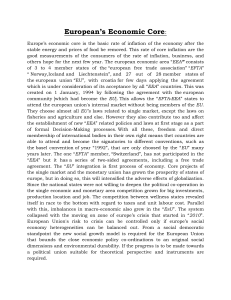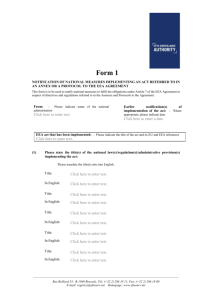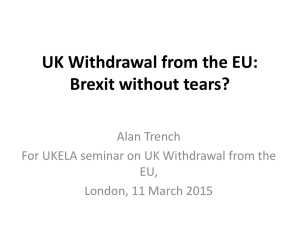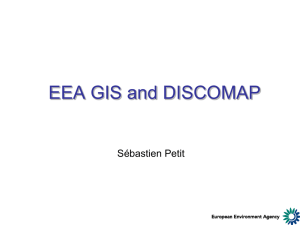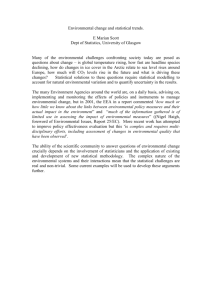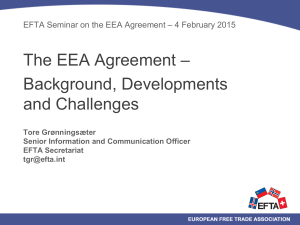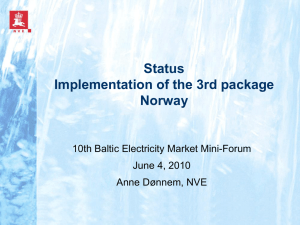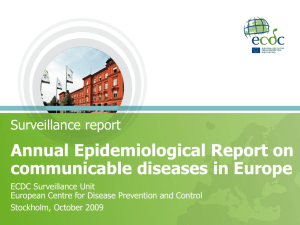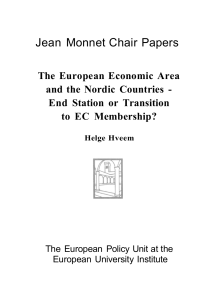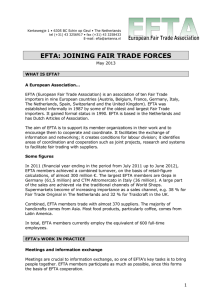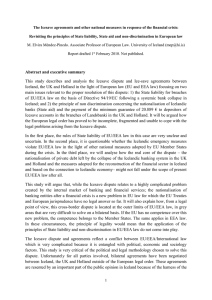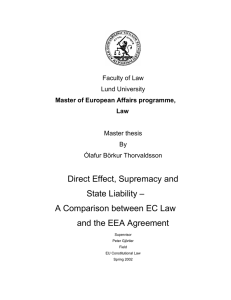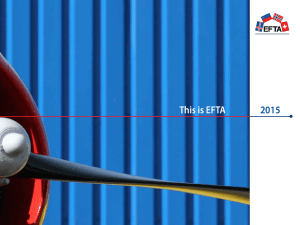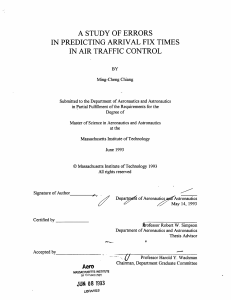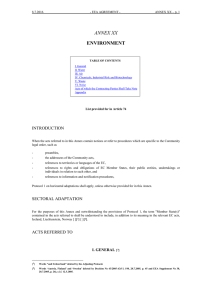David Baldock, IEEP
advertisement
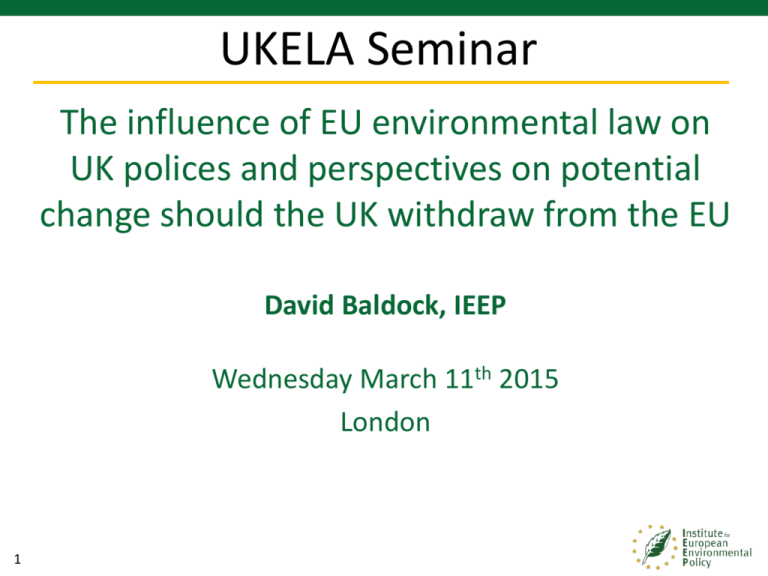
UKELA Seminar The influence of EU environmental law on UK polices and perspectives on potential change should the UK withdraw from the EU David Baldock, IEEP Wednesday March 11th 2015 London 1 Some Characteristics of EU environmental law (1) • Steady growth to become comprehensive • Principally in the form of directives, binding on Member States • Sensitive to but not confined to trans-boundary issues • In some areas responds to international obligations, conventions, influences • Linked to the single market • Numerous product standards and regulations • Often defining objectives (favourable conservation status) or targets (X% of renewable energy by date Y) 2 Some Characteristics of EU environmental law (2) • May require precise means to be used (EIA) • Structured by forward programmes and includes several long term goals • Confers relative stability, although periodic revision and role of ECJ • Still being extended but now mainly in consolidation stage • Probably the most influential and widely applied body of environmental law in the world 3 Some influences from the European Union • • • • • • • • • 4 The volume and scope of environmental policy in the UK The objectives and ambition Consideration of trans-boundary and pan-European issues Shift in the policy mechanisms employed e.g. environmental limit values The legal form and implementation / enforcement of policy Force of obligations on government and its agencies Penalties for non-compliance and other implementation issues Loss of flexibility for the government e.g. over timing Much extended influence over other Member States Related EU influences • • • • • • The Single Market; EU competence for trade The sectoral policies; CAP, CFP etc. EU funding and budgetary issues The global interface Perspectives and evidence from a wider Europe For ever in negotiation; environment within the wider deal • The UK as a shaper of EU policy in several areas, including climate 5 Speculating about future domestic priorities • UK climate ambitions sustained in most areas, some could increase • Product standards: change rather little? • Scale back air quality ambition? • Slower progress on waste / recycling / circular economy? • More ‘flexible’ approach to nature conservation? • Less money for agriculture and perhaps for agrienvironment? 6 Balance of Competences Review • General belief that it is in the UK interest for the EU ‘to have a degree of competence in the broad areas of environment and climate change because of the advantages that this brings for The Single Market and environmental protection’ • Those preferring national competence referred to land-use planning, noise, soil protection, flooding, environmental crime and environmental justice • Worries about burdens / costs on business (e.g. REACH) • More flexibility for Member States a double edged sword • Support for improving implementation of existing law 7 Departure Scenarios • Join EFTA (Iceland, Switzerland, Norway, Lichtenstein) • Join EEA (EU and EFTA members but not Switzerland) • Seek new / different status (e.g. looking for influence on single market decisions as well as being bound by them) • No obligation on other groupings to accept the UK 8 EFTA / EEA (1) • EFTA only model does not involve having to comply with EU environmental law but some measures may be accepted in return for single market access (voluntary adaptation). Multiple bilateral negotiations required. No access to EU decision making • EEA a closer relationship; some participation in the EU’s affairs but no vote; majority of EU environmental legislation applies in EEA, mainly because of single market linkage 9 EFTA / EEA (2) • However, some environmental law does not apply e.g. the Birds, Habitat and Bathing Water directives • CAP and CFP do not apply in the EEA • EEA Members make budget contributions to the EU (Norway £106 per capita in 2011, compares with £128 per capita in the UK) 10 Imagining a Process • Negotiating a new deal with the EU (environment included?) • Exit negotiations if decision is to withdraw • Negotiations with alternative partners • Transitional period to adjust • Carry over of extant EU law for a further period? 11 Some Issues • Prolonged level of uncertainty, with environmental consequences e.g. regarding compliance with EU obligations / targets • How to secure a manageable process? e.g. make the entire EU acquis into domestic law and then review / revise over time? • What happens as EU law moves on? • Would aspects of future EU legislation be weaker? • Would ECJ jurisdiction over relevant law continue? • Would the UK need to mimic CAP? • How would such a prolonged and profound upheaval be accommodated within the shrinking resources of the civil service machine? Widespread consultation presumably would be required 12 A Watershed • UK environmental policy has been transformed by EU membership • Withdrawal would create widespread uncertainty unless clear alternatives were in place • What would be the UK vision for the environment? • How would ambition and drive be maintained without the influence of the EU? • Is the scale of risk to the environment understood? 13 Thank you for listening Thank you for listening 14
